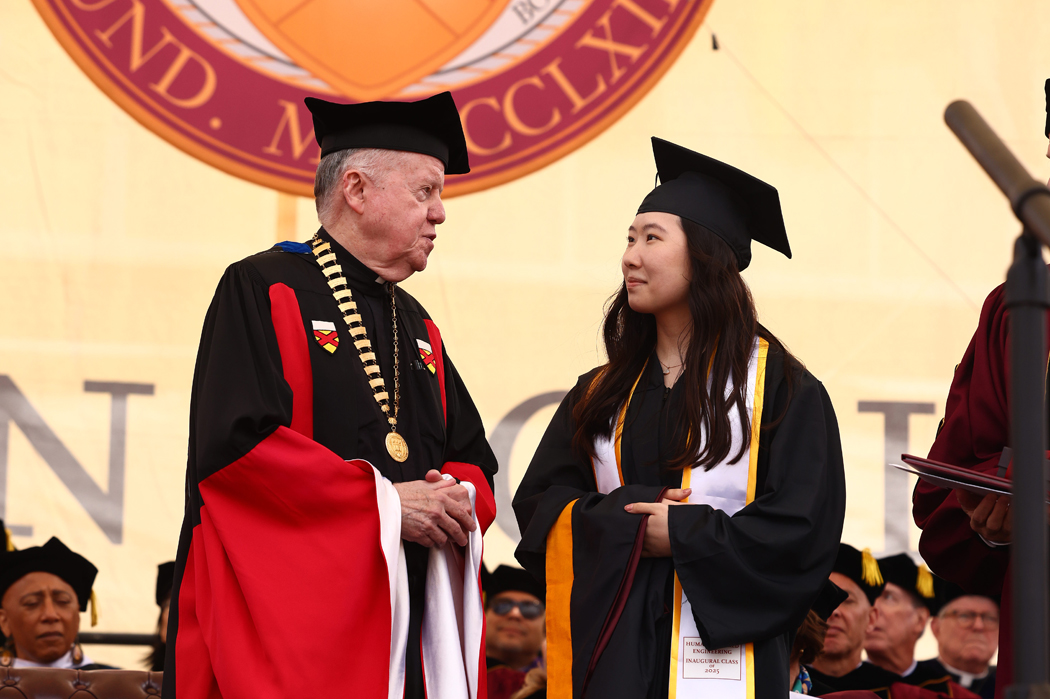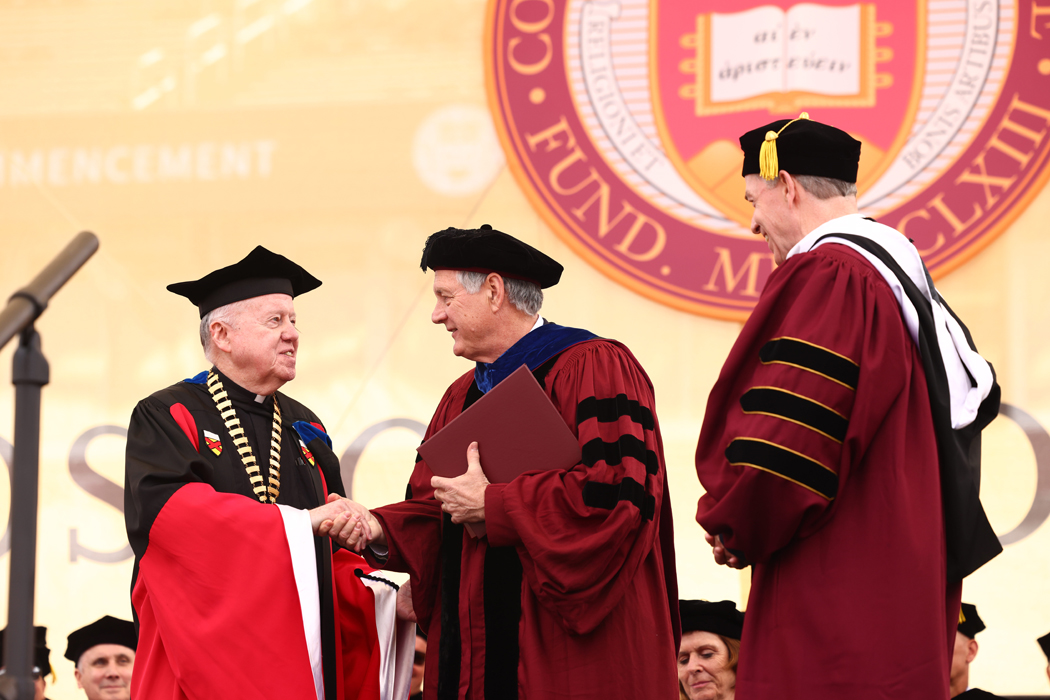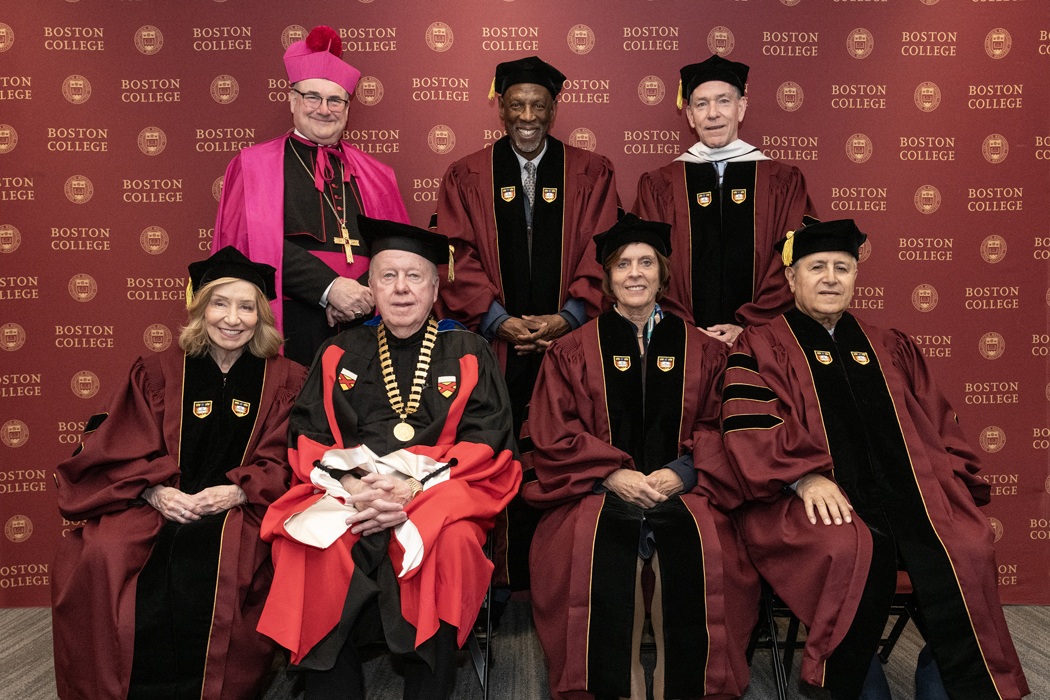
‘Superheroes are not born in quiet times’
Carnegie Corporation of New York President Dame Louise Richardson, an accomplished higher education leader who now heads an internationally respected philanthropic institution, told the Boston College Class of 2025 that college graduates are akin to superheroes—and they should fully embrace the resemblance.
“You look resplendent in your brightly colored maroon and gold robes, rather like superheroes with capes,” said Richardson, early on in her address at BC’s 149th Commencement Exercises on May 19. “In a sense, this is not an idle comparison. In every graduating class, young people, carrying only a diploma and a strong moral compass, need to fly out of these gates of the college and save the world.
“I mean it,” she added.
“Only with your skills, your intelligence, your diligent and patient work, will the people of the future gain life-saving medical treatments, brilliantly-designed buildings, new tools for living better and more fruitful lives, the chance of a just hearing in the law courts, and stories that tell the truth about our times.”
(L-R standing): Archbishop Richard G. Henning, Geoffrey Canada,
BC Board of Trustees Chair John Fish;
(Seated): Doris Kearns Goodwin, BC President William P. Leahy, S.J.,
Dame Louise Richardson, Salim G. Daccache, S.J. (Lee Pellegrini)
In addition to Richardson, who was awarded an honorary Doctor of Human Letters degree, the University presented honorary degrees to educator and social activist Geoffrey Canada; Salim G. Daccache, S.J., rector of Saint Joseph University of Beirut, Lebanon; historian and author Doris Kearns Goodwin; and Archbishop of Boston Richard G. Henning. Read the degree citations here.
Also at the ceremony, Hayoung Cho received the 2025 Edward H. Finnegan, S.J., Award as the graduating senior who best exemplifies the University’s motto, “Ever to Excel,” while Professor of Theology Stephen Pope—whose birthday coincided with this year’s Commencement—was presented with the Saint Robert Bellarmine, S.J., Award in recognition of his distinguished career and significant role in advancing the University’s mission.
Following the main Commencement event, the 4,512 members of the Class of 2025 received their undergraduate and graduate degrees at separate ceremonies held around campus.
In his Commencement greeting, University President William P. Leahy, S.J., said the day provided an occasion for “all of us to recall and give thanks for particular people, special moments, and gifts received, of friendships, experiences, and conversations that were life giving and affirming.”
Fr. Leahy offered his traditional acknowledgement not only for the graduates and their accomplishments, but the parents, spouses, family, and friends who provided them with support and encouragement. He also recognized the contributions of BC faculty and staff, as well as alumni, friends, and benefactors to the achievements of the Class of 2025.
“Our intent as a University community is that those receiving degrees today leave campus with at least the beginnings of how to respond to current opportunities and challenges, and also the necessary curiosity, tenacity, and abiding hope to do so,” he said.

Finnegan Award winner Hayoung Cho on stage with Fr. Leahy.
(Caitlin Cunningham)
Fr. Leahy noted the distinctive nature of the University’s Jesuit, Catholic heritage and its centrality to the education of BC students. “Our hope is that [they] will continue integrating beliefs and action, and reflecting on experience as a guide to life. We encourage them to take responsibility for their own spiritual and religious journey, drawing from the faith experiences they had while at BC.” He added that the graduates should “approach life as a vocation or calling, not merely a career.”
Richardson—whose career includes pathbreaking stints as first female vice chancellor at Oxford University and first woman principal and vice-chancellor of Scotland’s University of St. Andrews, in addition to being the first woman to head the Carnegie Corporation—touched on the manifold issues and concerns confronting humanity, notably climate change, socioeconomic inequality, and threats to democratic rules and norms. Fortunately, she told the graduates, the education they had received has prepared them well to confront such challenges.
“You have the courage and the intelligence to regard debate as a strength, and accurate, research-based argument as a superpower. You are equipped to distinguish the truth and the light and to fight for what’s right.”
Richardson noted that May 19—the date of this year’s Commencement—is the anniversary of the publication of Martin Luther King Jr.’s famous “Letter from a Birmingham Jail,” in which he asserted the necessity to confront racism and injustice not just in one’s community but everywhere it is present: “We are caught in an inescapable network of mutuality,” she quoted from the letter, “tied in a single garment of destiny.”
Those words, she said, apply in a practical sense—the failure to deal with climate change abroad affects America and vice versa—but also speak to a moral truth: injustice anywhere threatens justice everywhere.

Professor of Theology Stephen Pope receives
the Saint Robert Bellarmine, S.J., Award. (Caitlin Cunningham)
“The robes that you are wearing make especially visible the single garment of destiny in which we all are tied. They celebrate our connectedness. They also affirm the shared nature of our responsibility to one another, as global citizens.” Richardson said it is therefore imperative for graduates to engage with those who have different views than theirs, “to seek out those who oppose you and encounter them fairly and civilly.”
Higher education can and should play a critical role in addressing global problems, she said, because of its capacity to change lives, holding up her own as an example: the first in a family of seven children to attend college. Her education—funded not privately but through scholarships, she noted—created a bridge for her, as it has “for countless others” around the world. Richardson cited examples of how academia has been vital in offering solutions to worldwide problems, citing Oxford’s role in developing a vaccine against COVID-19 and the work of the BC Global Observatory on Planetary Health, which is conducting "invaluable” research on the dangers of plastic pollution.
“Universities are an unqualified good. We must not allow them to be cowed or diminished,” she said to enthusiastic applause, adding that they should be recognized as “seedbeds of tolerance, powerhouses of invention, generators of wealth, and beacons of free expression.
“As freshly minted graduates,” she said, returning to the superhero theme, “you are the new guardians of this galaxy.”
“ You have the courage and the intelligence to regard debate as a strength, and accurate, research-based argument as a superpower. You are equipped to distinguish the truth and the light and to fight for what’s right. ”
The genre of superheroes, Richardson observed, was invented “as a strong antidote to feelings of powerlessness and inevitability.” Superman—whose creators, she pointed out, were sons of immigrants to America—"was born out of aspiration toward an ideal that didn’t yet exist, and that was built out of the collective dreams of millions of people who wanted something better for their children. He is an outsider figure from another planet who represents everyone and cares for all, enough to risk his life anonymously to save them.
“Superheroes are not born in quiet times. You, as new graduates going out into a difficult world, unstable and divisive and in need of fresh ideas, have a unique opportunity to reset the clock. With you lies the burden of difficult responsibility. With you a marvellous universe of infinite possibility.”

